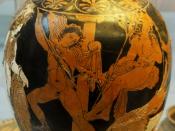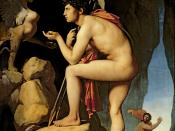Man With A Role
In ancient times, the Greeks pondered of what man's role in the universe was. The ancient Greek civilization knew that they were not equal to the Gods, but knew they were greater than animals in moral status. The ancient Greek people decided to position themselves in between Gods and animals, which they believed in confidently and would rarely question. Another Greek perception of the role of man in the universe is that man must suffer to gain knowledge. A Greek poet known as Sophocles wrote the story "Oedipus the King" based on a tragic Greek hero who would mock the Greek's perception of man's role in the universe, and Sophocles has given this ridiculer of the Greek's perception the name of Oedipus. Oedipus is a derivative of the traditional belief of a Greek man, for he has positioned himself as higher than normal men and nearly equal to the Gods.
Throughout Sophocles' story the motif of vision, light, and knowledge all intertwined with one another and portrayed throughout. Oedipus illustrates three main characteristics that can be associated with the vision, light, and knowledge motif. They are: hamartia, anagnorisis, and peripetia. Oedipus is an example of one who obtains the true knowledge through suffering.
Oedipus, like other fictional Greek characters, has a tragic flaw, or hamartia, which prohibits him to possess the true knowledge that he wishes to obtain. Oedipus believes he is a well raised child from a royal family with a very high social status. What Oedipus does not know is that he is has no blood relation to his family and in fact has been adopted. Oedipus flees from his adopted parents in fear of an oracle that stated Oedipus would kill his father and marry his mother. Oedipus later found himself as a...


